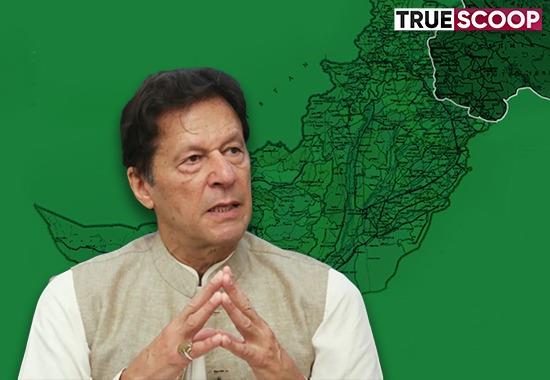Pakistan should be pushed into the Financial Task Force FATP black list’ as it continues to finance and tolerate terrorist organisations.
The global financial crime monitoring watchdog has put Pakistan on the grey list with PM Imran's government keen to exit from the list. FATF President Marcus Pleyer said during October's review meeting in 2020 that there were "very serious deficiencies" in Pakistan's efforts to counter terrorist financing and gave the country until the February 19-21 Plenary to resolve these issues as they cannot wait "forever", Greek City Times reported.
Pakistan has never taken things seriously and Terrorist organisations, such as Jammat Ud Dawa and Jaish e Mohammad (JeM), continue to operate with impunity in Pakistan and has a very strong base. In February 2021 The Financial Action Task Force (FATF) has decided to keep Pakistan on the “grey list” for failing to act on some key parameters. Pakistan was also put on the grey list of the FATF, the terror-financing watchdog in 2018. Prime Minister Imran Khan-led government has been under pressure to save Pakistan from being blacklisted over terror financing and money laundering.
Pakistan is home to at least 12 groups designated as ‘foreign terrorist organisations’, including five of them being India-centric like Lashkar e Toiba and Jaish-e-Mohammed, according to the latest Congressional report on terrorism. In this report published in 2021, US officials have identified Pakistan as a base of operations or target for numerous armed and non-state militant groups, some of which have existed since the 1980s, the independent Congressional Research Service (CRS) said in the report. According to an article published in the Hindu newspaper which quoted the report released by the bipartisan research wing of US Congress on the eve of the historic Quad summit here last week, said that these groups operating in Pakistan can be broadly categorised into five types — globally-oriented, Afghanistan oriented, India - and Kashmir oriented, domestically oriented, and Sectarian (anti-Shia).
So, why does Pakistan continue to be on the grey list? According to many Media reports Pakistan has :
1. Pakistans Inability To Check Money-Laundering Cases
Pakistan is one among the few countries to have figured in the grey list due to its failure to tackle terror financing. This has certainly come at huge economic costs to Pakistan, with foreign firms far more cautious about investing in it. This has led to its FATF greylisting.
2. Pakistan's Failure To Take Action Against Terrorists
One of the important reasons why the FATF has refused to take Pakistan off the grey list is due to its failure to take action against all the UN-designated terrorists. They include criminal masterminds like Jaish-e-Mohammed (JeM) chief Masood Azhar, Lashkar-e-Taiba (LeT) founder Hafiz Seed, and Zakiur Rehman Lakhvi, the LeT’s operational commander. Azhar, Saeed, and Lakhvi are the most-wanted terrorists in India for their involvement in numerous terrorist acts, including the 26/11 Mumbai terror attacks and the 2019 bombing of a CRPF bus in Jammu and Kashmir’s Pulwama and Pakistan has always supported them.
Pakistan is likely to remain on the grey list of global money laundering and terrorist financing watchdog FATF for failing to meet some of the targets under the additional criteria, according to media reports published recently.
With Pakistan's continuation on the grey list, it is increasingly becoming difficult for Pakistan to get financial aid from the IMF, the World Bank, the Asian Development Bank (ADB) and the European Union, thus further enhancing problems for the country.
Pakistan has so far avoided being on the black list with the help of close allies like China, Turkey and Malaysia. The Paris-based Financial Action Task Force (FATF) has once again retained Pakistan on the increased monitoring list, also known as the "grey list" and called the country to work on "complex money laundering investigations and prosecutions."
WHAT IS FATF?
The Financial Action Task Force, also known by its French name, Groupe d'action financière, is an intergovernmental organization founded in 1989 on the initiative of the G7 to develop policies to combat money laundering.
What is the objective of FATF?
FATF sets standards and promotes effective implementation of:
a.) legal, regulatory and operational measures for combating money laundering.
b.) The FATF works to identify national-level vulnerabilities with the aim of protecting the international financial system from misuse. As of 2019, FATF consists of thirty-seven member jurisdictions. India became an Observer at FATF in 2006. Since then, it had been working towards full-fledged membership. On June 25, 2010 India was taken in as the 34th country member of FATF.
FATF on terror financing
FATF's role in combating terror financing became prominent after the 9/11 terror attacks in the US. In 2001 its mandate expanded to include terrorism financing. Financing terrorism involves providing money or financial support to terrorists. As of 2019, FATF has blacklisted North Korea and Iran over terror financing. Twelve countries are on the grey list, namely: Bahamas, Botswana, Cambodia, Ethiopia, Ghana, Pakistan, Panama, Sri Lanka, Syria, Trinidad and Tobago, Tunisia and Yemen. The FATF works to identify national-level vulnerabilities with the aim of protecting the international financial system from misuse. As of 2019, FATF consists of thirty-seven member jurisdictions.
Also read: Netizens troll Kapil Sharma, As Vivek Agnihotri alleges TKSS makers refused to promote his movie
India became an Observer at FATF in 2006. Since then, it had been working towards full-fledged membership. On June 25, 2010 India was taken in as the 34th country member of FATF.
Irfan Attari Kashmiri
(The writer is the President of Kashmir Youth Web / & Chairman of Drug-Free Kashmir)
Email:- irfanattariofficial@gmail.com
